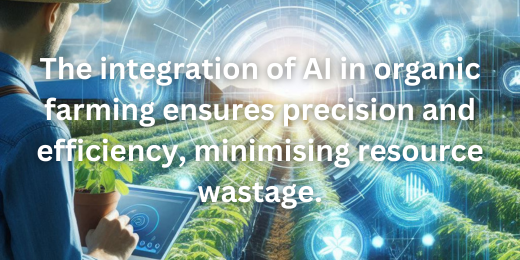
How AI and Robotics Are Revolutionizing Organic Farming: A Greener Future with Smarter Tech
AI in organic farming
Introduction: The Role of Technology in Organic Farming
Technology has revolutionised organic farming by addressing key challenges faced by traditional agricultural practices. The integration of AI in organic farming ensures precision and efficiency, minimising resource wastage. Smart tools and robotics are increasingly embraced to meet sustainability goals while enhancing productivity in organic farming operations.
The future of organic farming with AI lies in intelligent solutions that monitor crops and optimise farming techniques. Farmers use drones, sensors, and algorithms to gather data for improved decision-making and yield quality. These advancements support eco-friendly practices, reducing dependency on harmful chemicals and ensuring sustainable food production.
Adopting sustainable farming technology transforms agriculture, particularly in South India’s organic farms. Automated tools simplify tasks like planting and irrigation, ensuring consistent care for crops. By aligning with nature, these technologies support healthier ecosystems and promote a more resilient farming industry.
AI-Powered Sensors: Precision and Efficiency in Farming
Advancements in AI in organic farming have transformed crop management with precise and efficient monitoring systems. AI-powered sensors provide real-time data about soil health, ensuring optimal growing conditions for crops. These technologies help farmers make informed decisions, resulting in improved yields while minimising resource wastage and environmental impact.
The future of organic farming with AI lies in optimising resource usage for sustainable agricultural practices. By analysing water and nutrient needs, AI tools ensure plants receive adequate care without unnecessary wastage. This approach reduces dependence on harmful chemicals, promoting healthier ecosystems and ensuring high-quality produce for consumers.
Integrating sustainable farming technology has helped reduce pesticide reliance while maintaining excellent crop quality. AI-enabled systems identify pests early, allowing targeted actions that prevent extensive damage. Such innovations create an eco-friendly farming process, ensuring both productivity and environmental conservation for future generations.
Drones: Enhancing Farm Surveillance and Management
The use of drones has revolutionised AI in organic farming, enabling precise farm surveillance and management. Drones efficiently map farm areas, identifying growth patterns and pest infestations for targeted interventions. This advanced technology ensures accurate monitoring, reducing unnecessary resource usage and supporting healthier crops through sustainable agricultural practices.
The future of organic farming with AI relies heavily on integrating drones for efficient fertiliser and pest solution delivery. Drones can distribute organic inputs precisely, minimising waste and enhancing soil quality. Such innovative approaches ensure the long-term health of farmlands while supporting eco-friendly farming solutions that meet global sustainability goals.
Incorporating sustainable farming technology, drones minimise manual labour and improve overall operational efficiency for farmers. These devices save time and reduce physical effort by automating complex farming tasks. By boosting productivity, drones contribute significantly to the creation of an environmentally responsible and economically viable agricultural system.
Robotics: Automating Tasks for Sustainable Practices
Automated systems driven by AI in organic farming are revolutionising agricultural practices with precision and efficiency. Robotics enables automated weeding systems, significantly reducing dependence on harmful chemicals while promoting healthier soil conditions. These innovations help farmers maintain ecological balance, improving crop quality and sustainability without compromising environmental health or food safety.
The future of organic farming with AI relies on robotics for efficient harvesting methods that enhance speed and reduce crop damage. Robotic harvesting systems ensure high productivity while preserving the integrity of delicate produce. These advancements create opportunities for farmers to optimise yields and meet growing demands sustainably and efficiently.
Integrating sustainable farming technology, robotic solutions help lower labour costs while maintaining high-quality standards across agricultural operations. Through the automation of labour-intensive and repetitive operations, robots greatly increase operational reliability. Such technology fosters a balance between economic growth and environmental responsibility in modern organic farming.
Sustainability Benefits of AI and Robotics in Organic Farming
Integrating AI in organic farming minimises resource wastage, enhancing sustainability by efficiently using water, energy, and other essential inputs. Advanced systems help farmers optimise irrigation and energy consumption, reducing unnecessary environmental strain. These practices not only conserve resources but also create a sustainable framework for modern agricultural operations in organic farming.
The future of organic farming with AI highlights reduced carbon footprints through optimised farm operations, significantly contributing to eco-friendly agricultural practices. AI-driven tools streamline processes like crop monitoring and soil management, ensuring reduced emissions. By embracing such technologies, farmers can align with global sustainability goals while enhancing agricultural productivity and efficiency.
Adopting sustainable farming technology ensures long-term productivity by preventing soil depletion and promoting healthy farming practices. Robotics aids in precise application of nutrients, maintaining soil fertility for future cultivation. These advancements establish a harmonious balance between productivity and environmental responsibility in organic farming.
Future Outlook: AI and Robotics in South Indian Organic Farms
AI in organic farming provides affordable solutions, enabling small-scale farmers in South India to adopt innovative technologies efficiently. These advanced systems support organic farming practices by optimising operations, reducing manual labour, and improving productivity. Farmers benefit from affordable tools that enhance crop yields while maintaining environmental balance through technology-driven sustainable practices.
The future of organic farming with AI includes establishing farming cooperatives in rural areas, empowering communities to leverage technological advancements collectively. Shared resources like AI tools and data platforms promote collaboration, reducing costs for individual farmers. Such initiatives improve rural livelihoods by increasing agricultural efficiency and fostering a culture of innovation.
Implementing sustainable farming technology encourages eco-friendly practices, ensuring resilience against climate change and agricultural challenges. AI-based tools aid in minimising resource wastage, conserving water and soil health effectively. These approaches create a harmonious balance between productivity and sustainability, safeguarding the future of organic farming.
For comprehensive insights into organic farming and to explore a wide range of organic food products and fertilizers, visit your nearest Uyir Organic Farmers Market or shop online at www.uyironline.in or www.uyirorganic.farm.